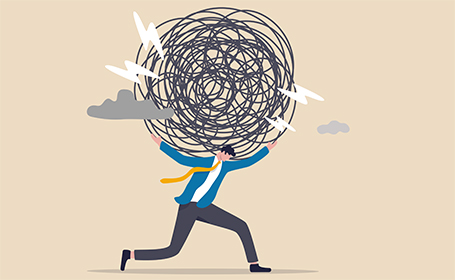
How does stress affect the body?
Stress can have a devastating impact on your physical wellbeing, affecting everything from your sleep hygiene to your cardiovascular health, and even causing increased sensitivity to pain
Here we’re exploring the various ways in which stress can impact you physically. We also provide stress management tips to help you combat stress and experience the best possible stress relief.
What exactly is stress?
 Harvard Health explains that your reaction to stress is known as the flight or fight response and is a means of ensuring your survival.
Harvard Health explains that your reaction to stress is known as the flight or fight response and is a means of ensuring your survival.
The stress response begins in your brain. When you experience stress, the amygdala (the part of your brain that regulates emotions) releases a distress signal to your hypothalamus (another area of your brain). The hypothalamus then activates your nervous system by sending signals to your adrenal glands. These are small glands that sit on top of your kidneys. The adrenal glands pump the hormone epinephrine (adrenaline) into your bloodstream. As adrenaline circulates through your body, it creates several changes.
What happens when you experience stress?
The first change that occurs in your body in response to stress is an increased heart rate. Your heart starts to pump blood faster across your body, and as this happens your blood pressure rises. As a result, the small airways in your lungs expand and take in more oxygen. This leads to an increased breathing rate and more oxygen is delivered to your brain. The increase in oxygen to your brain allows you to become more alert and your senses become heightened.
These physical changes impact your strength and stamina, speeding up your reaction time and enhancing your focus – essentially, preparing you to either fight or flee from the ‘dangerous’ situation you’ve found yourself in. You might even feel your stomach churn and your muscles clench, both of which are key signs of stress.
What causes stress?
Stress can have many triggers. According to Mind, increased responsibilities, being under pressure, large changes and a lack of control over situations are all things that commonly induce stress. A lack of stimulation, work, or change in your life can also trigger stress, as can the experience of hate or abuse.
There is no finite list of the causes of stress because they will be different for every person.
Can stress be a good thing?
Although stress can help you achieve deadlines or personal goals, prolonged stress can leave you feeling physically and mentally exhausted, which can make you more likely to develop illness. The NHS refers to this state of mental and physical exhaustion as burnout. It is caused by a feeling of powerlessness and concern that a situation cannot be resolved. But it is possible to overcome burnout by changing your environment and response to situations.
Stress causes your muscles to tense or spasm, which increases pain.
How does stress affect your health?
You might be surprised to learn that stress – especially when experienced over long periods of time – can have an impact on your physical health from head to toe. Here are some of the most significant ways stress can impact your health.
Stress can damage your immune system
Feeling stressed out can affect your overall health and increase your sensitivity to pain. Stress causes your muscles to tense or spasm, which increases pain. When you feel stressed, your cortisol levels rise. According to studies published by The National Library of Medicine, chronic elevations of cortisol can lead to your immune system becoming resistant, making you more susceptible to pain and inflammation. This can make you more prone to getting sick.
Prolonged or chronic stress can have damaging health consequences, impacting your immune system and your brain’s cerebrovascular (blood flow) system. Stress can weaken your immune system and increase your susceptibility to colds, flu, and fatigue.
Harvard Health says: "Abundant evidence shows that chronic stress chips away at physical health, pushing blood pressure to dizzying heights and harming the heart. It plays a role in diabetes, asthma, and gastrointestinal disorders."
Chronic stress can lead to chronic health problems
Elevated levels of stress in your body can cause consistently high blood pressure. Over time, high blood pressure can cause your heart muscle to weaken and thicken, as it forces your heart to pump blood faster. This can lead to heart failure.
The BMJ reveals that chronic stress can lead to the development of disorders such as dementia, Parkinson’s disease and motor neuron disease. It may also influence the likelihood of developing multiple sclerosis.
Stress can cause increased sensitivity to pain
Chronic stress can lead to increased levels of pain and, in turn, chronic pain can leave you feeling stressed out. This works as a vicious cycle of stress and chronic pain, leaving little room for relief.
The NHS reveals common symptoms of stress, such as tensed muscles, can in fact aggravate pain by causing muscle stiffness and aches. Tensed muscles can also cause discomfort and tiredness.
Ironically, stressful thoughts about your pain can also increase tension in your muscles and the intensity of pain you experience. Again, this builds a relentless cycle of tension, stress and chronic pain that is often difficult to break.
A study published by the BMJ found that people experiencing stress triggers such as financial difficulties, relationships problems or grief were more likely to develop chronic pain. The study showed that people who were overweight, female or suffering from depression or anxiety were also more likely to develop chronic pain.
These studies suggest that there is a relationship between stress and increased sensitivity to pain, as well as increased prevalence of chronic pain.
Stress can lead to disrupted sleep and painsomnia
Disrupted sleep induced by stress can also exacerbate your pain. Sleep deprivation can increase your sensitivity to pain by affecting how your brain perceives pain. The inextricable relationship between pain and sleeplessness is referred to as painsomnia.
This term was first used by members of an online community to describe insomnia (sleeplessness) caused by chronic pain. If you are suffering from painsomnia, you are less likely to have restorative sleep. This can lead to symptoms such as poor concentration and memory, and mental health problems such as anxiety and depression.

Symptoms of stress: what to look out for
So, what stress symptoms should you be looking out for? The NHS states that if you are constantly feeling anxious or overwhelmed and have trouble concentrating or sleeping, you could be suffering from high levels of stress. Moreover, other signs of stress include feeling irritable and experiencing a lack of self-confidence.
If you are stressed, you might be turning to food for comfort or find that you’ve lost your appetite. Stress may also cause you to smoke or drink more often.
Mental health charity Mind splits the common signs of stress into feelings and physical symptoms. Feelings brought on by stress might include:
- Feeling irritable or angry
- Overthinking or an inability to switch off
- Anxiety or depression
- Disinterest in life
- Low self-esteem
- A sense of dread
- Worrying a lot
- Feeling tense
- Exacerbation of existing mental health problems
Physical symptoms might be short- or long-term and can include:
- Fatigue
- Panic attacks
- Breathing problems
- Sleep problems
- Digestive upset
- Feeling sick or dizzy
- Chest pains
- High blood pressure
- Exacerbation of existing health problems
Stress can sometimes be caused by a feeling of a loss of control over your everyday life. Taking control and finding ways to tackle your stress can help you manage your stress and reduce your pain.
Stress management: what can you do to combat stress?
If you often turn to alcohol, caffeine or smoking to combat stress (known as avoidance behaviour), it’s time to reconsider how you manage stress, because these unhealthy habits not only don’t offer a solution, but they can also exacerbate stress.
Stress can sometimes be caused by a feeling of a loss of control over your everyday life. Taking control and finding ways to tackle your stress can help you manage your stress and reduce your pain.
Keep a stress diary
If you’re unaware of exactly what is triggering your stress, it’s useful to write a diary and keep track of what happened when you were feeling stressed and how you feel in stressful situations. The NHS advises keeping a stress management diary for at least two to four weeks. You can then review this diary and establish what triggers your stress and how you typically react, helping you build a stress management plan.
Take time for yourself
It’s essential to have ‘me time’. During this time, turn off your phone or computer to avoid distractions and try to find a space to be alone. This break from the stress of work and screentime allows you to focus on yourself. As little as 30 minutes every day could seriously improve your stress levels.
Practice meditation
Meditation is another stress relief technique that you can do to combat stress. The deep breathing exercises used in meditation can lower your blood pressure and reduce your risk of developing heart disease.
Stay active
Exercise can offer stress relief by releasing endorphins. Endorphins are chemicals that are produced by your body that are responsible for boosting our mood and promote pain relief. Going for a walk every day or taking part in sports can not only provide you with stress relief but can also alleviate your pain.
Is it time to de-stress?
If you are struggling with stress, a counsellor or therapist can help support you and provide you with advice on stress management. If you want to speak with one of our therapists, book your appointment online today or call a member of our team directly.
Tags
How do I book an appointment?
If you're concerned about symptoms you're experiencing or require further information on this subject, talk to a GP or see an expert consultant at your local Circle Hospital.